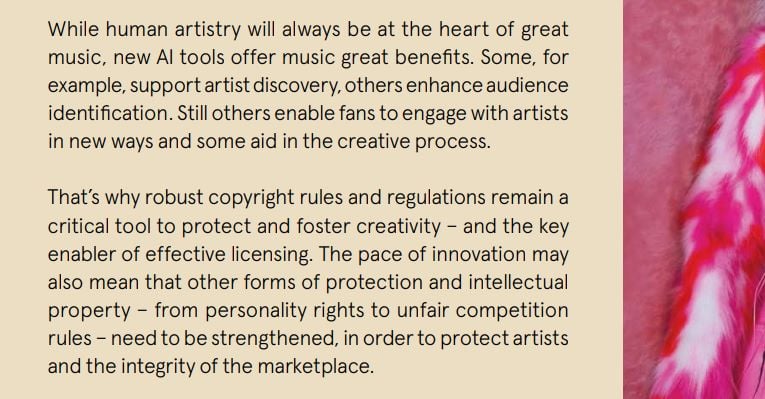 Artificial intelligence has the potential to make our lives more efficient, entertaining, and productive. There are potential downsides as well.
Artificial intelligence has the potential to make our lives more efficient, entertaining, and productive. There are potential downsides as well.
From a copyright perspective, AI brings up some interesting questions. For example, can content created by an AI be copyrighted? And can an AI be trained on copyrighted works without limitation?
Before ChatGPT and other AI tools started to dominate the news, the music industry had already shared its concerns over the potential threats posed to its business. The RIAA, for example, reported several AI ‘vocal’ extraction tools as a looming piracy threat last October.
Since then, numerous experts have opined about the copyright challenges AI presents. As such, it is no surprise that the topic is also mentioned in IFPI’s annual Global Music Report, which discusses the state of the global music industry.
A few years ago, online piracy and stream-ripping were featured as cannibalizing technologies, but those have now disappeared into the background. Instead, AI gets a prominent feature, with several music industry bosses commenting on the technology.
The Music Industry’s Looming AI Threat
IFPI’s report starts out by saying that AI isn’t all doom and gloom. It also offers several opportunities for artists and the broader industry.
“Some, for example, support artist discovery, others enhance audience identification. Still others enable fans to engage with artists in new ways and some aid in the creative process,” IFPI writes.

The report stresses that when AI is used, the ‘human’ element should always remain from and center. At the same time, robust copyright rules and regulations must be respected.
The human element is also highlighted by Michael Nash, Chief Digital Officer at Universal Music Group. Nash believes that AI should not replace human artistry. And if an AI uses copyrighted content to create something new, the original rightsholders should get paid.
“[U]nless creators are respected and properly compensated when and if their works are used to train AI, then you’re going to see the world’s creative community potentially suffering a lot of damage in the evolution of generative AI.
“We need to work very hard to define new models so that we can enable generative AI without looking away from what is essentially going to be wholesale hijacking of the intellectual property of the entire creative community,” Nash adds, mentioning this as a top priority.
AI-Synthesized Voice
This general sentiment is shared by Dennis Kooker, Sony Music’s President of Global Digital Business. Kooker also sees potential in AI as a tool to work smarter and gain new insights, but not at the expense of copyrights.
Kooker is particularly concerned about AI tools that can mimic artists’ voices, which have the potential to replace the human efforts of its top-grossing artists.
“In particular we have serious concerns about the potential for AI-synthesized voice technology to be used at scale to cover songs and attempt to replace artists. This is something that we need to watch very closely,” Kooker notes.
This concern isn’t conceptual, but ultimately boils down to revenue. Sony probably doesn’t mind if artists train an AI on their own voice, but if an unauthorized third party does so without compensating the original artists, that becomes a problem.
While not mentioned, there’s also an alternative ‘Black Mirror’ future where labels could handsomely profit from AI by replacing flesh-and-blood artists with AI. That’s still a bridge too far, at least for the time being.
People Went Nuts
Music industry bosses are not the only ones keeping an eye on AI-generated vocals. These tools are already widely used. Most notably, DJ David Guetta played around with AI earlier this year, and used his homebrew “Eminem” lyrics in front of a live audience, who apparently “went nuts”.
“I discovered those websites about AI. Basically, you can write lyrics in the style of any artics you like,” Guetta explained.
“So I [wrote] a verse in the style of Eminem about Future Rave. And I went to another AI website that can recreate the voice. I put the text in that and played the record and people went nuts.”
You can see Guetta’s excitement about the potential of AI while he’s retelling his experience. However, clearly, not everyone shares this enthusiasm. And it wouldn’t surprise us if this was made clear to Guetta behind the scenes.
“Obviously I won’t release this commercially,” Guatta clarified in a follow-up tweet the next day.





